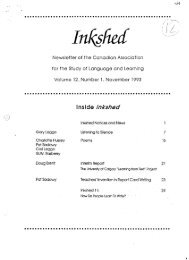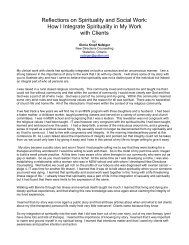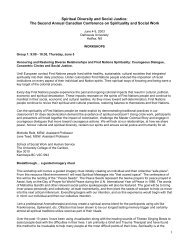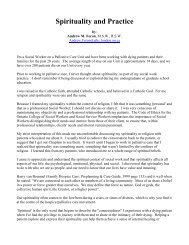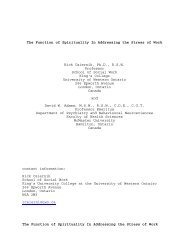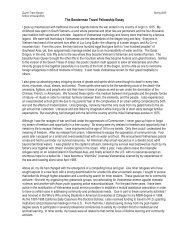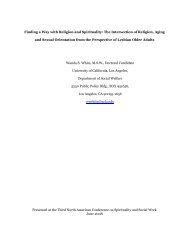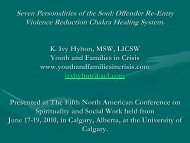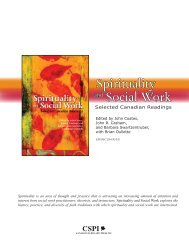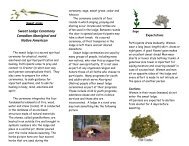The Wellness Wheel: An Aboriginal Contribution to Social Work
The Wellness Wheel: An Aboriginal Contribution to Social Work
The Wellness Wheel: An Aboriginal Contribution to Social Work
Create successful ePaper yourself
Turn your PDF publications into a flip-book with our unique Google optimized e-Paper software.
<strong>The</strong> authors begin by explaining a North American <strong>Aboriginal</strong> worldview as well<br />
as a philosophical perspective of life. <strong>The</strong>y describe the nature of a holistic approach <strong>to</strong><br />
well-being and demonstrate its relevance, not only in <strong>Aboriginal</strong> milieu, but for people of<br />
various cultures in <strong>to</strong>day’s society. <strong>The</strong>y then identify the characteristics and objectives<br />
of the Medicine <strong>Wheel</strong>. In preparation for the development of an individual’s own<br />
wellness plan, a four-step concrete and practical set of exercises is proposed and followed<br />
with recommendations for assessing self-progress in the pursuit of balance and harmony<br />
in one’s life. <strong>The</strong> authors conclude the article by reaffirming their position about the<br />
relevance of this approach <strong>to</strong> helping and healing in <strong>to</strong>day’s modern world.<br />
2. <strong>The</strong> <strong>Aboriginal</strong> Worldview and Philosophy of Life and <strong>Wellness</strong><br />
<strong>The</strong> <strong>Aboriginal</strong> worldview is comprehensive and spiritual in nature (Bopp et al,<br />
1984; Laugrand, 2002; Mehl-Madrona, 1998 & 2003). It is indeed impossible <strong>to</strong> discuss<br />
this worldview without considering spirituality as a vital element since it is seen as<br />
pervading every aspect of life (Royal Commission on <strong>Aboriginal</strong> Peoples, 1996).<br />
According <strong>to</strong> Morrisseau, (1998:88), the Native significance and purpose of spirituality is<br />
“the process and relationship we have with our greater power… the part of you which<br />
helps you see the beauty along the way…[and] the goodness in [others]”.<br />
Duran & Duran (1995:15), for their part, describe the <strong>Aboriginal</strong> perspective of<br />
life as “a systemic approach <strong>to</strong> being in the world” (our emphasis). <strong>The</strong>y consider it<br />
more important <strong>to</strong> develop our ‘being’, than <strong>to</strong> grow in our capacity for ‘doing’ or<br />
‘having’. It also implies being part of nature, that is, connected <strong>to</strong> and respectful of all of<br />
creation, since all created things are considered <strong>to</strong> have a spirit and <strong>to</strong> be alive (Ross,<br />
4




